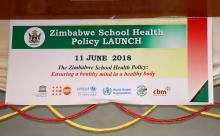Zimbabwe launches School Health Policy
6 June 2018. Today Zimbabwe launched the School Health Policy as a strategic means to promote positive health determinants while preventing and mitigating health risks among learners. The policy, which was developed jointly by the Ministries of Health & Child Care and Primary and Secondary Education, has the vision of “A primary and secondary education system with an enabling environment for the provision of equitable, sustainable and quality health services for all learners.” The vision resonates well with the agenda for Universal Health Coverage. Through promoting health in schools, Zimbabwe can be sure that they are contributing to the aspiration of “leaving no one behind,” and an effective school health programme is one of the most cost effective investments a nation can make to simultaneously improve education and health. The launch was attended by the Ministers of Health and Child Care, and Primary and Secondary Education, other senior Government Officials, members of the UN family, development partners and civil society representatives.
The Policy is seen as a bridge to engage the education sector in efforts to positively influence the educational, social and economic conditions that affect health. In addition, ensuring that a school-going-age population is healthy is key for the achievement of the Sustainable Development Goals (SDGs). If health programming misses this age group it will be difficult to achieve the third SDG of Good health and well-being as well as the fourth goal on ensuring quality education, for without good health and provision of quality education it will not be possible to eradicate poverty (SDG 1). The policy, therefore, demonstrates that there should be strong interface between SDG3 and SDG4. The school Health Policy also presents an opportunity to address Neglected Tropical Diseases (NTDs) through Mass Drug Administration, Vitamin A and Iodine deficiencies; prevention of cancers such as cervical cancer through HPV vaccination among other public health interventions.
In a speech read on his behalf by Mr Eddie Rowe, WFP Representative, the UN Resident Coordinator, Mr Bishow Parajuli said since the majority of adolescents and young people in Zimbabwe still spend the majority of their time in school, implementing a robust school health programme increases the reach of health promotion interventions in this age group. “HIV remains a significant public health concern in Zimbabwe especially among adolescents and youths, therefore, the School Health Program provides an opportunity for us to step up HIV prevention efforts among young people, and to promote adherence for those young people who are already on treatment,” said Mr Parajuli. He also said most social behaviours that influence alcohol and drug abuse are formed during the school going years, so the school has an important role to promote positive behaviours to curb these lifestyle ills. Mr Parajuli also urged the Ministries of Health and Education, development partners and stakeholders to work collectively to transform the strategies outlined in the policy document into practical programmes, plans and activities to ensure that all leaners benefit from the provisions of the policy.
Countries with the greatest demographic opportunity for development are those entering a period in which the working-age population has good health, quality education, decent employment and a lower proportion of young dependents. Zimbabwe has a largely young population and investing in school health can help to spur economic growth and in the process ensure that Zimbabwe harnesses the demographic dividend.



